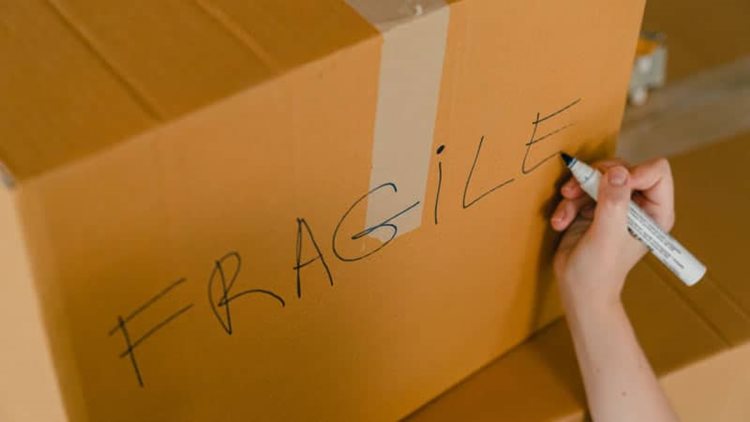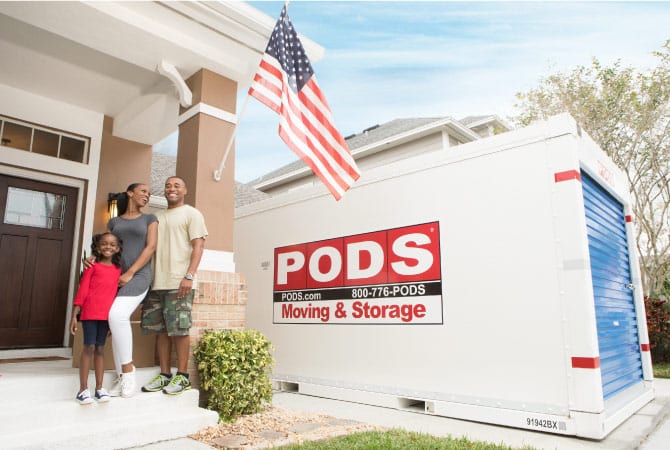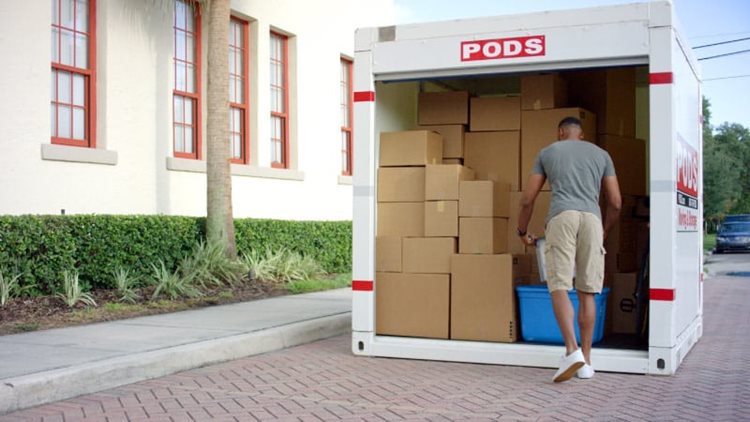
The Ultimate Military Storage Guide: How to Prepare for Your PPM
Military Moving
| Does PODS have a military discount? Yes! PODS is proud to serve the men and women who serve our country. Active, retired, and veteran members of the military receive a PODS military discount. For PPM/DITY moves or storage during deployments. Call 866-556-9574 to get a quote. |
If you are a member of the U.S. military (or a family member who is supporting someone who is), you know this life of service comes with its opportunities as well as challenges. One of the biggest challenges? PCSing on a regular or semi-regular basis. We get it, and we’d like to help simplify the PPM process with advice on military storage.
We’ve compiled this military storage guide to help you figure out what can be stored, how it should be properly stored, and where to find the best storage solution for your specific situation. Whether it’s military school, your next deployment, the end of your career, or other situations that come up while serving, PODS has you covered.
Military Storage — FAQs
Q: What is military storage called?
A: The military storage facility for a Personally Procured Move (PPM) is called Non-Temporary Storage (NTS). Service members must have orders authorizing storage, and costs may be covered for a set period. The military approves specific NTS facilities, and coordination happens through the Transportation Service Provider (TSP) or Personal Property Office. Temporary Storage (TS) is also an option for short-term needs (up to 90 days) during a PCS move.
Q: Do storage units have a military discount?
A: Some companies — including PODS — do provide military storage discounts. Be sure to ask about any potential discounts that you could take advantage of!
Q: Should I look for a storage company with a national reputation?
A: Yes, you’ll want a company with a national reputation that has plenty of experience with military storage, like PODS. You’ll find secure PODS Storage Centers across the country and, because PODS containers are portable, they can easily be transported to your next destination when you’re ready — particularly useful when you’re PCSing on a regular basis.

Research military storage providers before making a selection to ensure you make the most of your PPM.
Research PPM Military Storage Providers, Including Packing and Protection Options
A PPM can be both flexible and financially advantageous because service members move their own household goods and are reimbursed for eligible expenses. Going with a storage company that understands PPM requirements is essential for saving as much as possible. Here are some questions you may want to ask as you’re vetting military storage providers:
- Do they come in and pack things for you?
- What is the cost if you pack versus if they pack?
- Do they offer guarantees or policies on breakage? This may be different, depending on whether you handle the packing or they do.
- Do they provide a military storage container so your items don’t get damaged?
- Do your special items — like high-end electronics and flat-screen televisions — have different packaging needs?
Ask as many questions as you can upfront to avoid any confusion later! VIDEO
Determine Your Military Storage Size Requirements
From a handful of military storage boxes to entire homes, there are military storage solutions that are sized to fit everything. Plus, there are many size guides that companies such as PODS offer to help make this easier than you might expect.
How much military storage do you need for your home? Here’s a brief overview that can help you make your selection:
- The 8-foot container is the smallest PODS container size available. It will store items for a 500-square-foot home.
- The 12-foot PODS container can hold the items found in a typical 500–800-square-foot home. This size is only available for local moving and storage.
- The 16-foot PODS moving and storage container can hold the contents of a 1,200-square-foot home.
These are estimates, though, and you are ultimately the best judge of how large your individual items are and whether you may want to declutter and downsize before making your military storage selection.
| Insider Tip #1: Check out what kind of payment programs a company has for military storage and whether you can do online or automatic payments to make life easier. If you’re actively deployed, the last thing you’re thinking about is military storage payment due dates, right? The term of the contract — whether it is month-to-month or longer than a year — should also be a factor in your decision. |
Estimate Your Military Storage Costs
As you know, costs will vary depending on your military storage provider. So, how much does it cost to rent a PODS container for storage?
- PODS storage start at $149/month and vary depending on the size of the container and where it is stored (on your property or at a secure PODS Storage Center).
- Additional fees may apply (e.g., contents protection, delivery, and pick-up).
- Remember to take advantage of the PODS military discount for service members!

The right type of military storage for you depends on what you’re packing.
(Source: Ketut Subiyanto via Pexels)
Choose the Right Type of Military Storage
Storage containers can hold a variety of things, but certain items (like vehicles) may need special care. Not all facilities accommodate large items – cars, motorcycles, motorized equipment, etc. — so if you need vehicle storage, look for facilities that can accommodate that.
Below are key tips for picking the right military storage solution:
- Household goods: Standard storage works for most household goods.
- Sensitive items: Antique furniture, vinyl records, valuable art, and books are a few examples of things that may be damaged by high heat or humidity. More on this below!
- Cars/motorized vehicles: Only some facilities allow these; prioritize security (cameras, gated access).
- Large or specialty items: If you have something like a boat or RV, confirm size limits and outdoor/covered storage options.
- Short- vs. long-term storage: Confirm any fees, coverage options, and accessibility that will apply during your storage period.
Assess Your Climate-Controlled Military Storage Needs
When storing your belongings during a PPM, some items need extra protection from temperature swings and humidity.
What Is Climate-Controlled Storage?
- Climate-controlled storage facilities usually maintain a temperature between 55℉ and 78℉ and humidity levels at or below 55 percent.
- These facilities use AC and dehumidifiers to prevent damage to stored items caused by excessive heat, cold, or moisture.
- Climate-controlled storage is good for sensitive items that could warp, crack, or deteriorate in extreme conditions.
What Items Require Climate Control?
If you’re storing delicate, valuable, or moisture-sensitive items, opt for climate-controlled storage. The following items should probably be stored in a climate-controlled facility.
- Antique wood furniture
- Electronics
- Art, photos, and important paper documents
- Musical instruments, especially ones made with wood
- Fine wine and collectibles
| Insider Tip #2: Moving your grandmother’s antique quilts? A favorite chair? First-edition books that you inherited? All of these are best stored in climate-controlled storage. |
For items that are not sensitive to heat and humidity, non-climate-controlled storage options will work just fine. The list below is nowhere near complete, but it’s a good starting point for the kinds of things that can be stored in non-climate-controlled storage.
What Items Don’t Require Climate Control?
- Hardware and kitchenware
- Seasonal decor
- Patio furniture
- Toys
- Sports equipment
Avoid Storage Container Mold and Mildew Issues
Mold and mildew thrive in damp, dark places, and since storage units are already dark, it’s up to you to keep them dry. Always inspect items before storing them, avoid moving in wet weather, and take extra precautions to protect your belongings.
- Check (and double-check) that every item is completely dry before storing.
- Wrap furniture and delicate items in moving blankets or packing paper and plastic wrap for extra protection (don’t use plastic wrap on its own as it could trap moisture).
- Use plastic bins instead of cardboard since they resist moisture and pests better.
- Add moisture absorbers (like silica gel packs or desiccant buckets) to fight humidity. Secure moisture absorbers so they won’t tip, spill, or leak inside the unit.
| Insider Tip #3: Clear bins that have strong sides and lids are often the best option for long-term storage. Not only do they make getting things out of storage easy (since you can see through the containers), they are also easy to carry and won’t get mold or mildew, like cardboard boxes can. |

Dedicated storage containers — like the ones from PODS — only hold your belongings, and you have the only key, so they stay closed until you open them.
Prevent Possible Security and Damage Issues
When selecting a portable storage container, it's important to consider the type of trailer used for transportation, especially for long-distance moves. Regular trailers can expose your belongings to road vibrations and potholes, while air-ride trailers significantly reduce damage.
Additionally, if your shipment isn’t a full load, other items may be placed on the same trailer, increasing the risk of lost or misplaced belongings.
Steps To Minimize Risk of Damage:
- Opt for air-ride trailers to protect your items during transit.
- Choose a dedicated container (like PODS) that only holds your belongings and ensures you have the only key so no one can open it.
- Toys
- Choose a secure storage unit facility that isn’t open to the general public. With PODS, you are the only one with a key to your container, and if you need access, you can schedule a visit.
By selecting a secure, dedicated storage solution, you can avoid unnecessary stress and help keep your belongings safe.
| Insider Tip #4: PODS is a great storage choice for active, retired, and veteran members of the military. In fact, PODS has already served more than 500,000 customers in the military community. PPM with PODS and save more when you take advantage of PODS’ military discount! |
Consider Purchasing Coverage for Your PPM
You may want to consider purchasing damage coverage for your items during your PPM. Although homeowners insurance typically covers your possessions at home, during transit, and in storage, it usually doesn’t include damage caused while movers are packing or handling them.
- Check to see if the coverage is automatic or whether you can pay an additional amount to have it.
- Be well informed about what is covered and what is not.
- Review the storage company’s policies to understand how to submit a claim if an item is damaged while in the storage container.
| Insider Tip #5: There are certain items that should travel with you instead of the rest of your belongings. These can include important papers, financial information/deeds, and enlistment papers, to name a few. |
Take Into Account Factors That Could Impact Your Military Storage Timeline
There is a huge difference between moving to Wisconsin in January and setting up storage in Arizona in August. If you’re going to be in an extreme climate during its harshest season, you’ll want to consider the following:
- How long will your items be stored?
- What kind of systems does the storage unit or building have in place?
- Is there a charge for holding your items for a certain amount of time beyond the original time frame?
- The total cost, if possible, especially if your timeline is subject to change.
- The cost of storage along with moving those stored items to your final destination.

Plans can change, even when you’re on military time! Make sure you’re working with a military storage provider who offers flexibility so you don’t get stuck with a large final bill.
Ensure Your Military Storage Provider Offers Flexibility
The military may sometimes modify assignments. So, if something happens, you want to work with a company that will allow you to get your belongings in a timely fashion if there is a change in orders.
- Ask about the cancellation policy.
- Know the storage company’s policy for long-term versus short-term storage.
- Inquire about time-length rates.
| Ready to plan your PPM? Call 866-556-9574 or visit PODS.com to get a military moving and storage quote. And don’t forget to ask about the PODS military discount! |
Karen Dybis is a freelance journalist and a frequent contributor to the PODS Blog. Her work has appeared in Time magazine, U.S. News and World Report, The Detroit News, and more.
Related Articles
Comments
Leave a Comment
Your email address will not be published. Required fields are marked *
